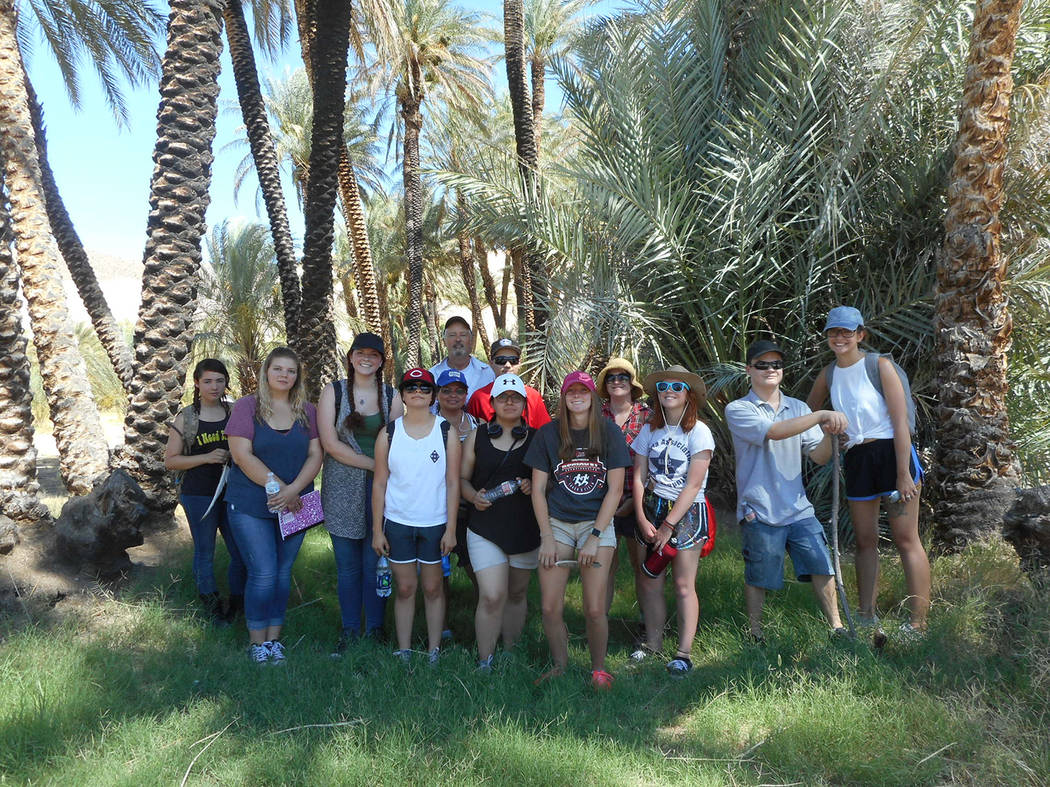
“There’s a mosquito problem in Borneo,” says Claire Vaye Watkins, standing in front of a group of teenage writers in the shade cast by an outer wall of the gift shop at Tecopa’s China Ranch Date Farm.
They’ve come here, early on a recent Wednesday morning, in a van rented by the Mojave School summer writing workshop in Pahrump, to think about what it means to tell a story.
With the guidance of master storytellers Claire Vaye Watkins and Derek Palacio, whose books have appeared on the New York Times, Washington Post, and many other prestigious Best Book lists, the students learned about different kinds of writing and trying out their skills.
Just now they are talking about a satirical essay on mosquito abatement called “The Top of the Food Chain,” and about how writers can speak for and affect their environments.
Case in point is Brian Brown, owner of China Ranch, who’s been telling the story of the Tecopa desert for over 20 years.
In small, hand-lettered signs, in knowing exactly where to cut away the brush to reveal hidden secrets of the land, in advocating for protection of the elusive Amargosa River that runs not far from the edges of his property, Brown has been “telling the China Ranch story,” he says, “and letting people discover it for themselves.”
‘There are stories here’
Watkins, who spent her childhood in Tecopa and later graduated from Pahrump Valley High School, credits Brown with opening her eyes, on a similar field trip when she was a teen, to the fact that “there are stories here.”
Those stories were the basis of Watkins’ first book, “Battleborn”, a short story collection that won the 2012 Story Prize, a Nevada Writers Hall of Fame Silver Pen award and other national recognition of her work.
Her most recent book, “Gold Fame Citrus”, she says, is a kind of horror story fable about what happens when the water in the desert goes away—the legacy, she says, of growing up with a constant awareness of the “extremity and fragility of the landscape”.
The exploration of life stories through horror fiction is popular among the students here today.
Fifteen-year-old Jacob Castleberry is writing a novel, a complex horror tale plotted with sequels in mind.
Of ideas, Castleberry has plenty, he says, and he’s already finished one book. What he was missing, and he says he discovered this month, was the art of adding in the details.
“They’ve taught me a lot,” Castleberry says. “I should be describing things more. In a scene where a character drinks expired soup, I should describe the taste, how it feels in my mouth, the smell.”
The students
Many of the 13 students who registered for this year’s Mojave School session, ranging in age from 14 to 18, were already working at their own writings, from poetry to short story to novels.
Crysta Steele, 14, writes on the microfiction website Creepy Pasta, and another student said she writes on WattPad, an app for reading and writing original fiction on a smartphone.
Hardcastle, a student at Pathways, learned of the Mojave School through an article in the newspaper.
Many of the other students said they learned about the workshop through their teachers at Pahrump Valley High School or friends who forwarded the announcement. Registration was completely free, including transportation to and from the week-long workshop at Nye Communities Coalition each morning for students who needed it, as well as all field trips.
How it works, what’s next
The Mojave School is funded almost entirely by Watkins and Palacio, Watkins says.
This year the University of Michigan’s Helen Zell Writer’s Program contributed by funding the participation of writer Rebecca Flores, a former student of Watkins’ in the university’s Master of Fine Arts program.
Watkins says the Mojave School has averaged about a dozen students per season since it began in 2013.
Later, students and teachers planned to celebrate the completion of the workshop by giving public readings from their writings at the Writer’s Block independent bookstore in the Las Vegas Arts District.
When the course ended, and Palacio and Watkins planned to return to their current home in Michigan.
Watkins says she hopes the students will continue to look upon their teachers as “real teachers, who will support them down the road. We hope they’ll think of us as resources in the future.”
For Hardcastle, the workshop opened not only an opportunity to learn more about writing, he says, but it was just as important to meet other writers.
“I’ve been teased most of my life,” Hardcastle says, “but here I feel accepted.”
Robin Flinchum is a freelance writer and editor living in Tecopa, California. Her book, “Red Light Women of Death Valley,” was published last year.